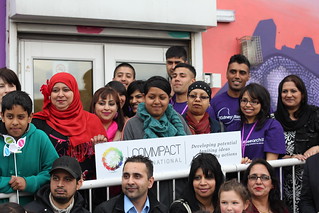In most organisations, cost cutting means looking for big ticket savings in merger, payroll or service delivery. But when there is no organisational fat left to trim, what should you put under the financial microscope? When the money stops, the thinking starts…Read more over on the Guardian’s online network for the voluntary sector.
Tag Archives: third sector
“I feel privileged to be different; I wouldn’t want to be the same as everyone else.”
Above, a film about the making of a play about Down’s Syndrome at a Camphill Village Trust community, The Grange in Gloucestershire.
Today’s the start of Learning Disability Week. What’s it like living with a learning disability? A few years ago, my sister, who has Fragile X syndrome, spotted the teenager next door embark on her first driving lesson. “I’ll never do that,” she quietly remarked. Quick as a flash, my mother replied: “You might not, but there’s plenty of other things you do brilliantly.”
Another time she asked why she had Fragile X syndrome. A plain, simple question and one that the rest of us asked for some time after her diagnosis (the answer: the genetic lottery). That was a tricky moment – it wasn’t that she required a literal explanation of the genetic make up that set her apart, but she was struggling to make sense of why there were certain things she found difficult to do and certain situations she felt uneasy in.
Unable to avoid some cliches, we explained that everyone’s different – wouldn’t the world be a boring place if we were all the same? – and talked about her amazing achievements which regularly leave us awe-struck, biodynamic farming among them.
If you’ve no experience of learning disability, you might assume that people like my sister potter along aimiably, existing in a smiley, hand-flapping, blissful state of ignorance, unable to articulate or appreciate the extent of their special needs.
The illuminating and moving film, above, about the making of a play about Down’s Syndrome at a Camphill Village Trust community, The Grange in Gloucestershire, lets the actors speak for themselves:
“I can’t be like Robin or Claire; I’m different.”
“It feels weird being with Down’s Syndrome.”
“To be honest, I feel quite privileged to be different; I wouldn’t want to be the same as everyone else really.”
The playwright, whose brother has a learning disability, recalls the days when those with learning disabilities were ushered away from mainstream society: “I was seven and he was nine when we were separated…my brother was tucked away in a sheltered workshop.. he would be a footnote..something to be forgotten.”
While grim institutional care is no longer the only option for people with learning disabilities, the horrific goings-on at the Winterbourne View care home and new Mencap research on disability hate crime are just two reminders of the massive problems that remain.
For me and my family, the awareness week that starts today means not only appreciating the scale of the challenge when it comes to creating a fairer society for the learning disabled – and demanding action – but celebrating the achievements of those we feel proud to call “different”.
“Sometimes I get cross with my parents because we don’t have a normal life.”
Above, young carers talk about their role in a Carers Week film.
Next time you feel fed up with doing the household chores, think about Ryan. At 13, he cooks, cleans, does the laundry and helps both his disabled parents get around the house. His father has Crohn’s disease and his mother is disabled.
Aside from the physical requirements of his role as a young carer, Ryan shoulders a huge amount of emotional stress; life is unpredictable because his parents’ health varies from day to day. Getting ready for school in the morning, for example, is hard because he worries about leaving his parents alone and fears his dad will be in hospital when he gets home. The teenager gets frequent headaches, stomach aches and suffers from irritable bowel syndrome, all of which his GP says is stress-related. It is easy to see how being a young carer can adversely affect education, health and wellbeing and lead to isolation and anxiety.
Ryan, who is lucky enough to be supported by a young carers project run by the charity Action for Children, is one of an estimated 700,000 children and young people who have caring responsibilities. Young carers represent over 10% of the UK’s 6m carers, the group of people highlighted in Carers Week this week.
Action for Children is using Carers Week to demand that the government and councils do not ignore the plight of young carers. The charity has released new figures today which show that, in a survey of 23 Action for Children young carers projects, services supporting 1,192 young carers have had their budgets cut by up to 30%. A further 192 young carers are supported by services that have suffered budget cuts of 40% or more.
As Ryan says, he would be lost without support from his young carers project. “I really rely on that time with my support worker to express my worries. It’s amazing to share my experiences with other young carers who understand what it is like to be me. I love my parents but sometimes I get cross with them because we don’t have a normal life and I can’t do the same things as my friends. I used to feel guilty and bad about those feelings but after talking to other young carers I know that we all have feelings like that sometimes and its okay. The young carers project arranges all sorts of activities for us to help us relax and enjoy our time off from looking after our parents. It’s like having a little holiday away from all the worry.”
Budget cuts to support services for young carers save money now but run the risk of undermining young carers’ futures. As Hugh Thornbery, director of children’s services at Action for Children, says, there is already a huge danger that those who need care start relying on children and young people to support them even more as statutory service provision is decimated. This situation, as the charity stresses, effectively means young carers – many of whom spend up to 50 hours a week looking after a relative – bear the brunt of the country’s deficit and might end up paying for it with their futures.
* To find out more the impact of caring resonsibilities on the young, try also checking out the very good Victoria Cares site, a week-long campaign by children’s charity Spurgeons revealing a week in the life of young carer Victoria.
“The kid who talked of burning down the place is now volunteering to paint it…”

Hutton Hall community centre, photos by Podnosh
A year ago it would have been pointless painting a mural on the wall of Hutton Hall; it would have been covered in grafitti within a day. But after the building was transferred to community group Comm:pact by Birmingham city council in April, youngsters treat it – and its new exterior artwork – with pride. Read about how to make community asset transfer work in my Guardian piece today.
Is Cameron’s ‘big society’ reserved for the rich?

Local philanthropy and volunteers have driven the ‘big society’ in Surrey for years. So is David Cameron’s flagship project only viable for affluent communities? England’s well-heeled home counties are the natural habitat of Cameron’s “big society”. The combination of a time- and cash-rich population and minuscule pockets of deprivation is more conducive to citizens becoming involved and running services than in more deprived areas. Click here to read the piece in Society Guardian today.
What no big society?
Amid the vibrations of doom and whiff of ennui surrounding anything stamped with the politicised big society seal, a new campaign tagged in plain terms as a grassroots effort to improve a neighbourhood is a bit of an attention-grabber.
Shockingly, no one’s claiming it’s part of some shiny new renaissance in volunteering that will allow the state to retreat on the sly, but a tried and tested idea, backed by an organisation that’s been doing similar, citizen-led work for years.
Quick – Dave’s on the line – he wants his big society back!
Today’s launch of Shoreditch Citizens – part of well-established community organisers programme London Citizens – follows an audit of 200 organisations in the east London area, plus 500 meetings to identify local issues that matter and train community leaders.
The Shoreditch arm is the latest chapter for London Citizens, an alliance of 160 groups representing faith institutions universities and schools, trade unions and community groups; the founding member is The East London Communities Organisation (Telco), the UK’s largest independent community alliance launched in 1996.
Shoreditch Citizens has high hopes in aiming to join forces to impact on poverty, poor housing and gang crime – around 75% of the area’s children live below the poverty line and four in 10 adults are unemployed. The campaign, funded by the Mayor’s Fund for London and £270,000 over three years from the community investment arm of Barclays Capital, also wants an alternative to the education maintenance allowance (EMA) to encourage young people to stay in education. There is also a plan to make Shoreditch a “Living Wage” zone, where everyone who works in the area can be sure to earn a decent amount to live on. The Living Wage campaign was first launched by London Citizens in 2001, which says it has won over £40 million of Living Wages, lifting over 6,500 families out of working poverty.
By December 2012, the Shoreditch engagement programme aims to train 300 community leaders from 30 civil institutions and hopes to impact on up to 15,000 families. All this is nothing if not ambitious, but if you don’t have goals…
How the law stops young people using advanced wheelchairs
Like most 13-year-olds, Jenny Wilson likes to go shopping with friends. Her athetoid cerebral palsy means that she has used a wheelchair for almost a decade, but she is capable of negotiating busy high streets. Yet Jenny’s independence is under threat – not from her disability per se, but by a legal anomaly that means she breaks the law if she uses the wheelchair that best meets her needs. Read my piece in Society Guardian here.
Illegal immigrants:not as simple as sending them all home
Peter Solomon, 46, is a former trade union representative who spent 17 years in the transport sector. He is a hardworking taxpayer and father-of-three who, until recently, worked as a security guard in Manchester where he rented a flat. He is also an illegal immigrant.
Some illegal immigrants should be returned home, according to an IPPR report seized on by the government to support its hardline stance. But it’s not that simple, as I explain in this piece in Society Guardian today.
Being visionary about sight loss
A new exhibition aims to challenge prejudice about sight loss and explore notions of sensory perception by showcasing works by visually impaired artists inspired by the sense of smell.
The two-day pop-up exhibition, Scents and Sensibility, is organised by sight loss charity RNIB and opens at central London’s Vaad Gallery on Monday. The theme is fragrance expressed through exhibits including painting, sculpture and photography. Read about it in my Society Guardian piece today.

60 reasons to be cheerful
Need a reason to smile amid the cuts? How about 60? A bold new exhibition which opened last week presents the 60 bright young things making a difference by volunteering in schools across London.


The exhibition, Full of Purpose, was lauched last week and presents portrait shots, as shown above, of members of City Year London, a project that involves 18-25-year-olds mentoring and supporting primary school pupils.
Based on a successful American model of civic duty that began in 1988, you can read more about it in this post written for The Social Issue by corps member guest blogger Alex Scott. Founded in 1988, more than 12,000 corps members have helped millions of children in 20 US cities and in Johannesburg, South Africa.
The shots by documentary photographer Katie Higson are exhibited at City Year London’s offices in north London until Thursday. As well as the images, the exhibiton includes information about the young people’s work and their motivations for giving a year to serve in schools and communities.
As volunteer Alex says: “I joined City Year because I wanted to spend a year doing something more challenging…as my long term goals lie in entering a career in counselling or therapy, a mentoring role was something that excited me. City Year has proved to be both challenging and incredibly fulfilling. Often it is hard to measure the effect you are having on a day-to-day basis, but every time I am able to see progression in one of the children it makes the long hours worthwhile.”
For more information, contact City Year London.
